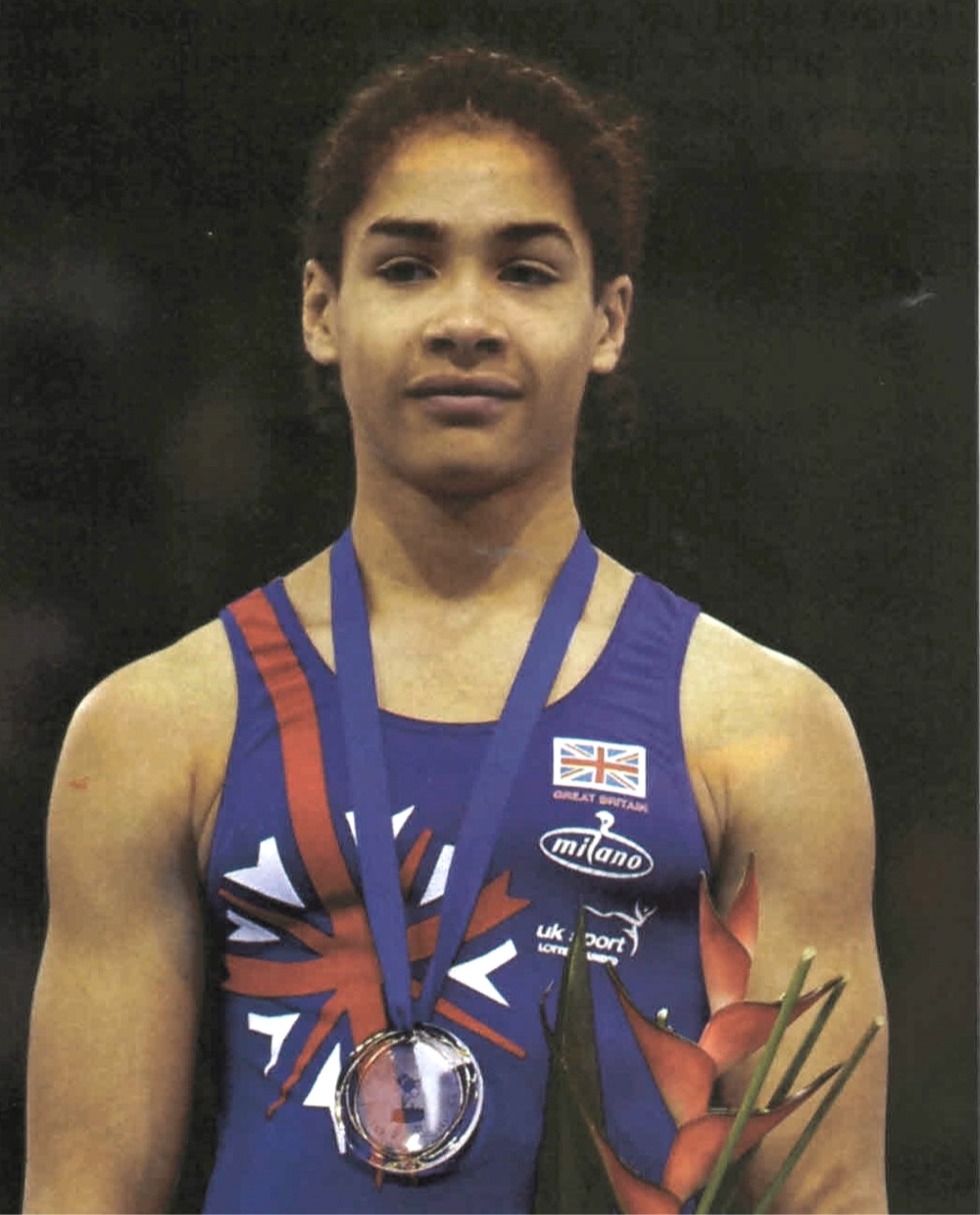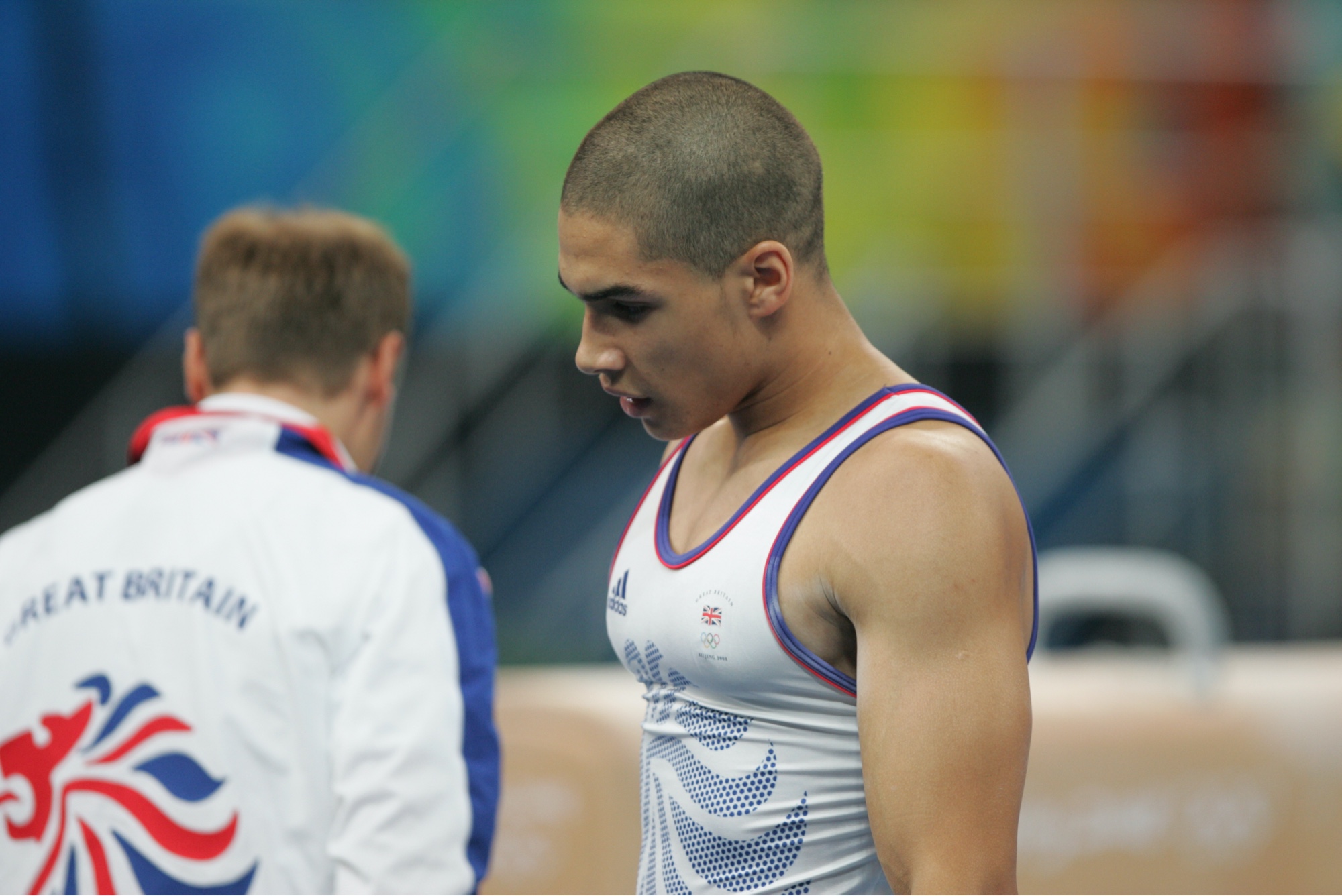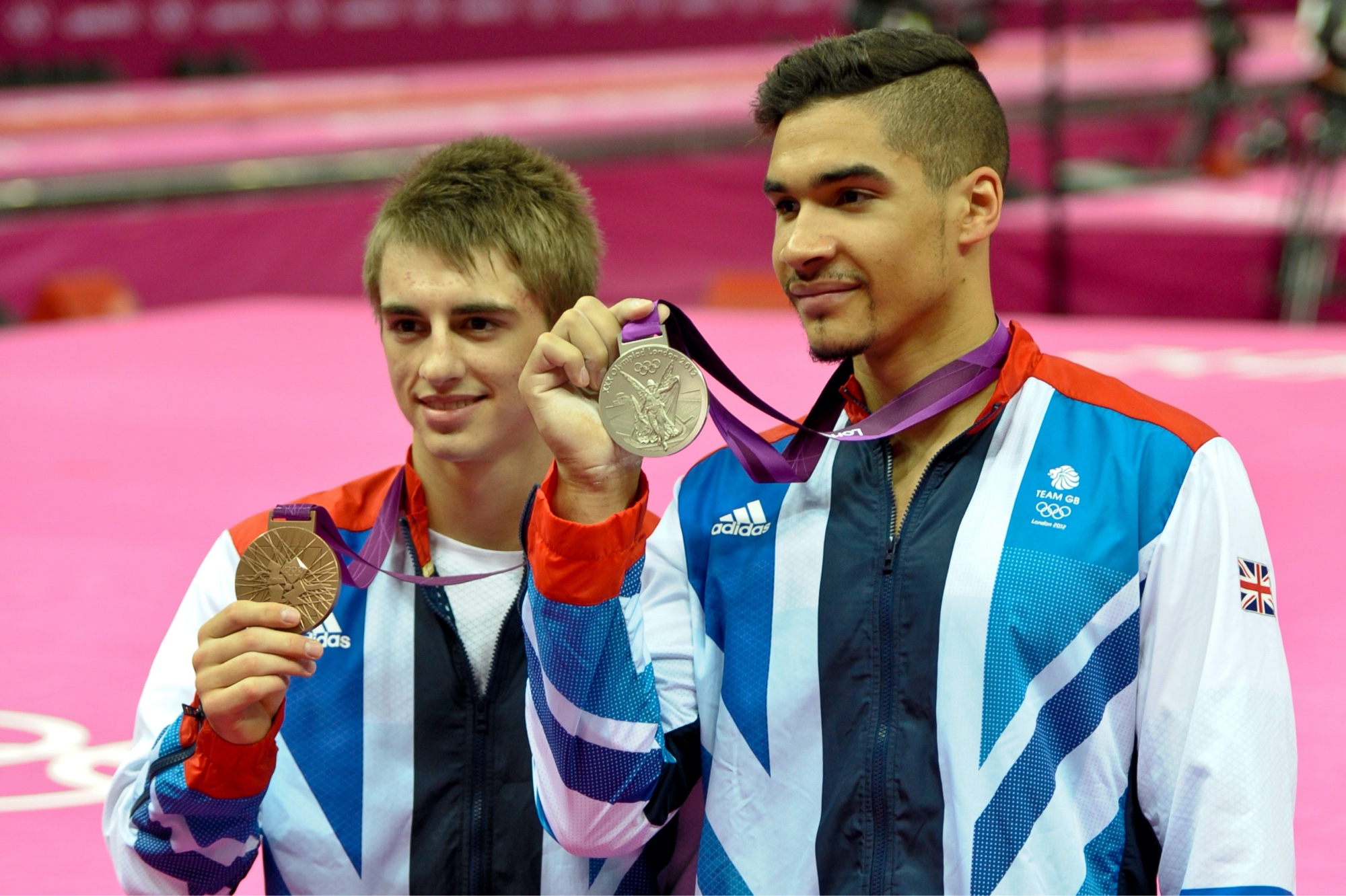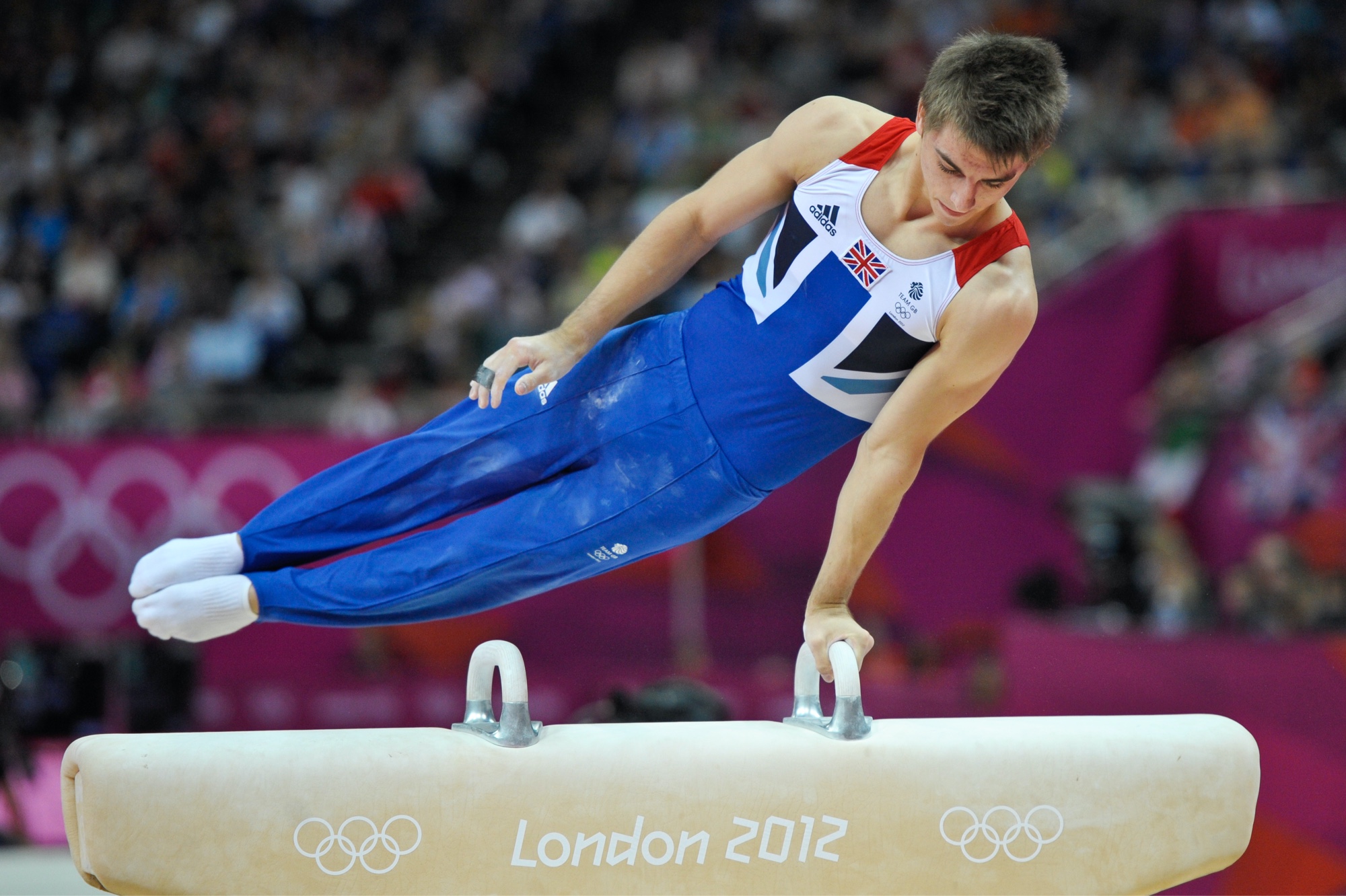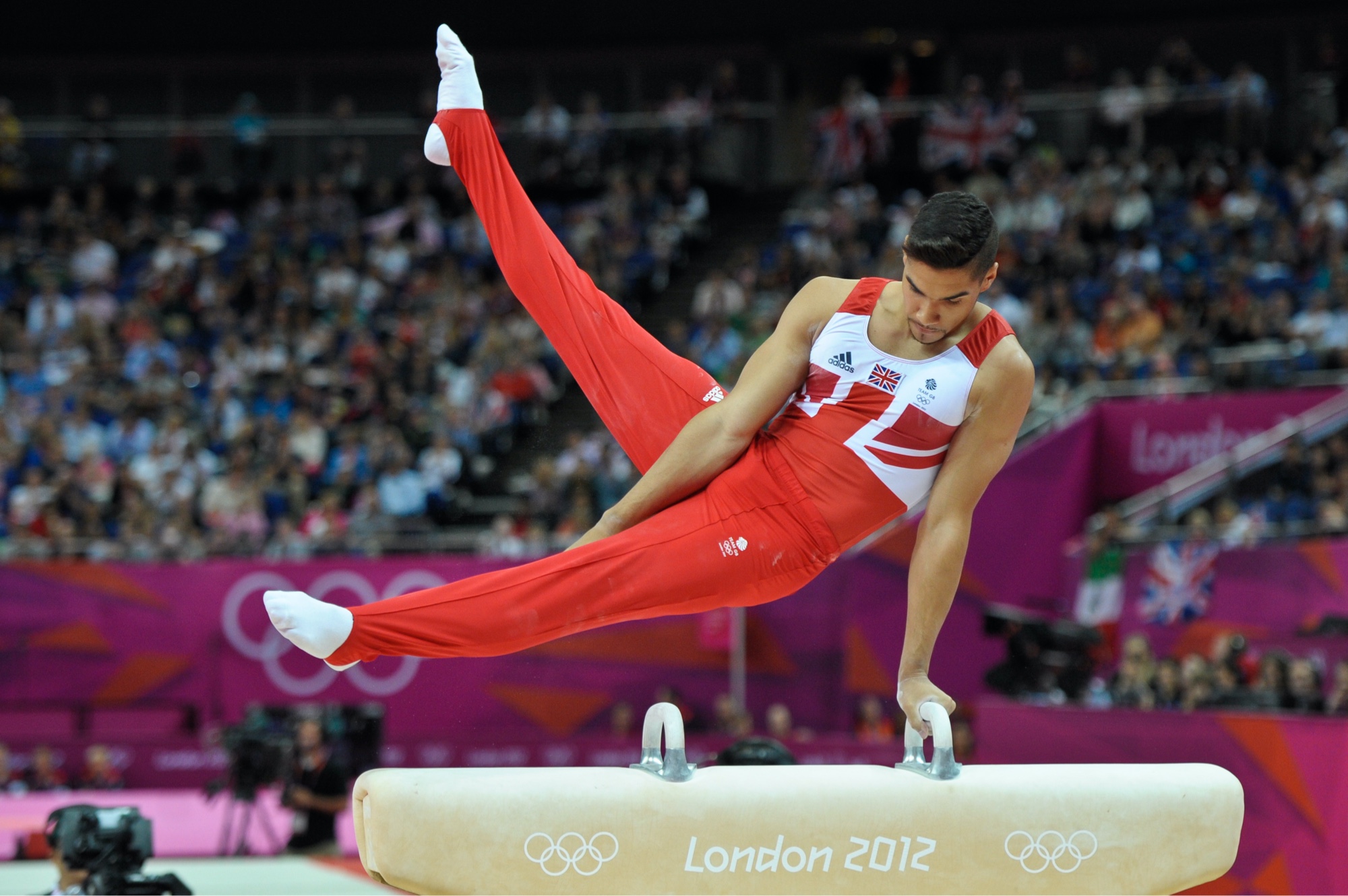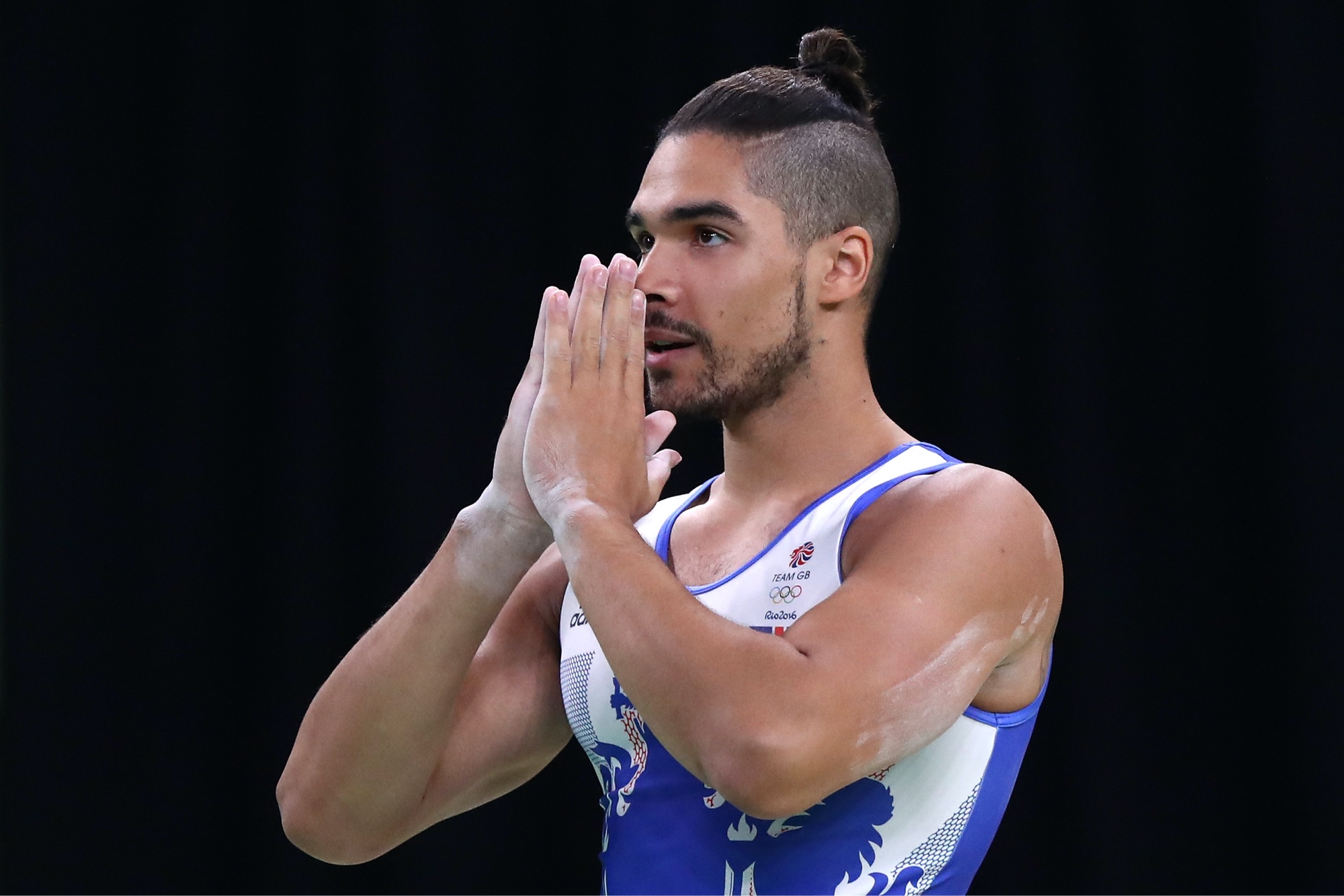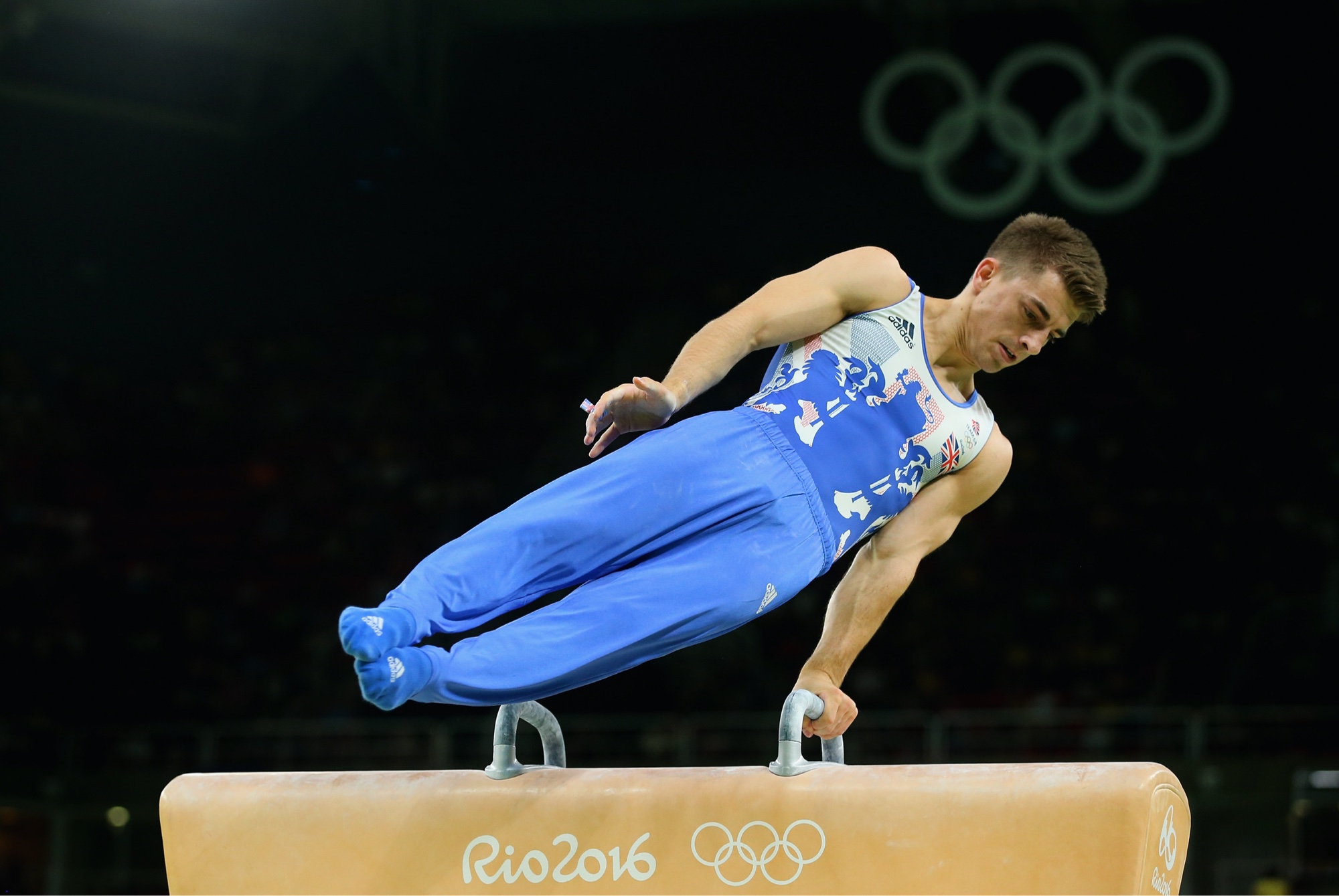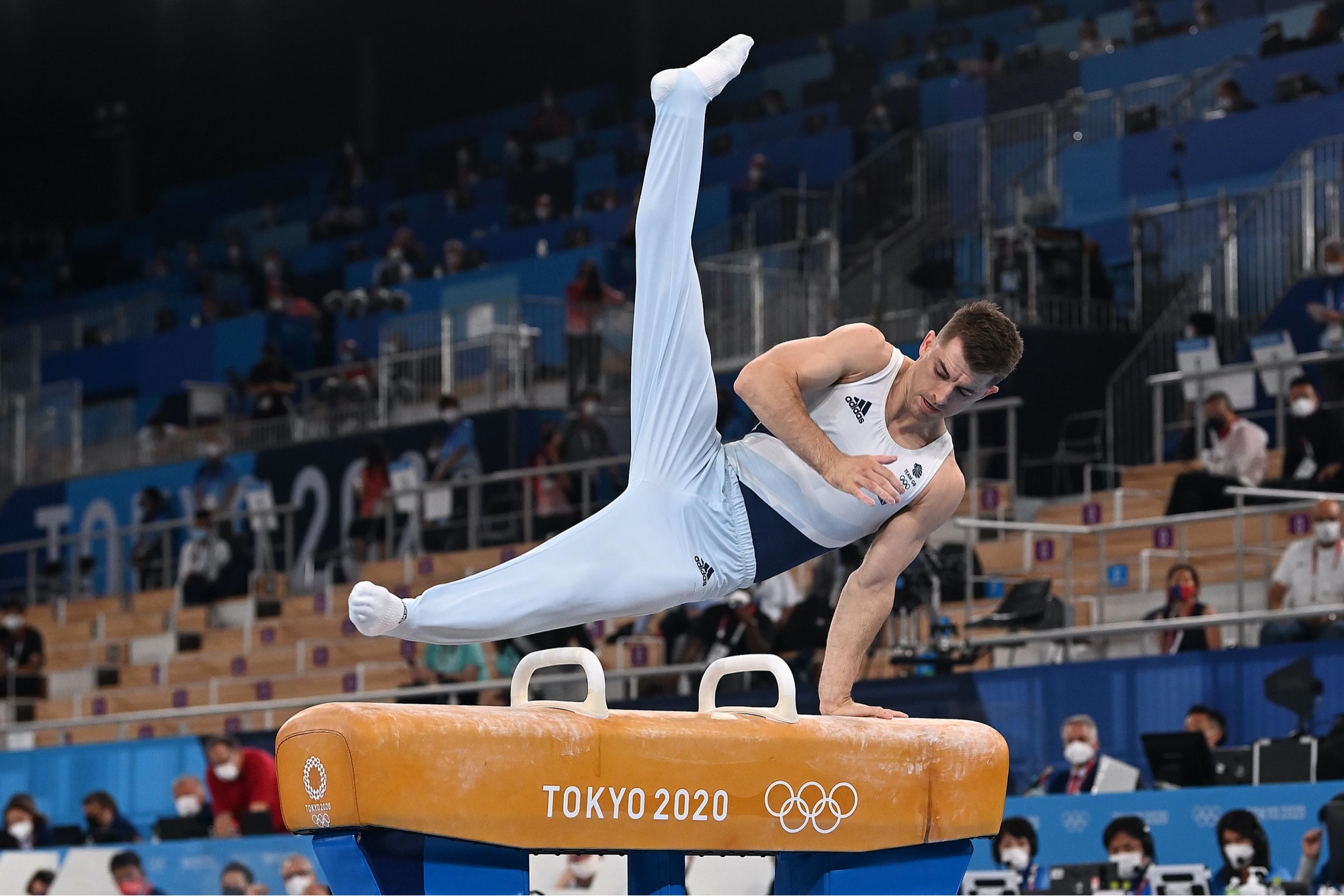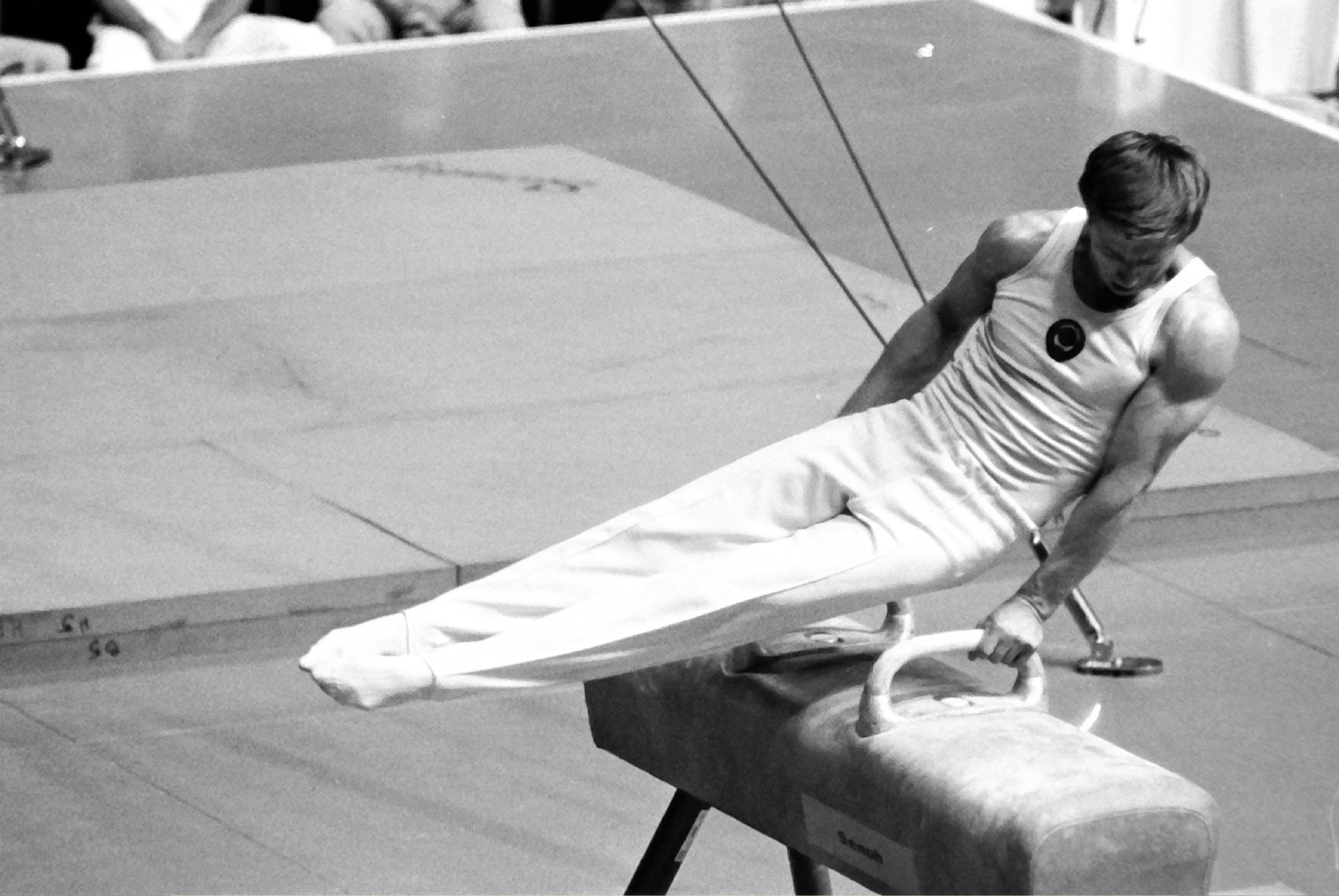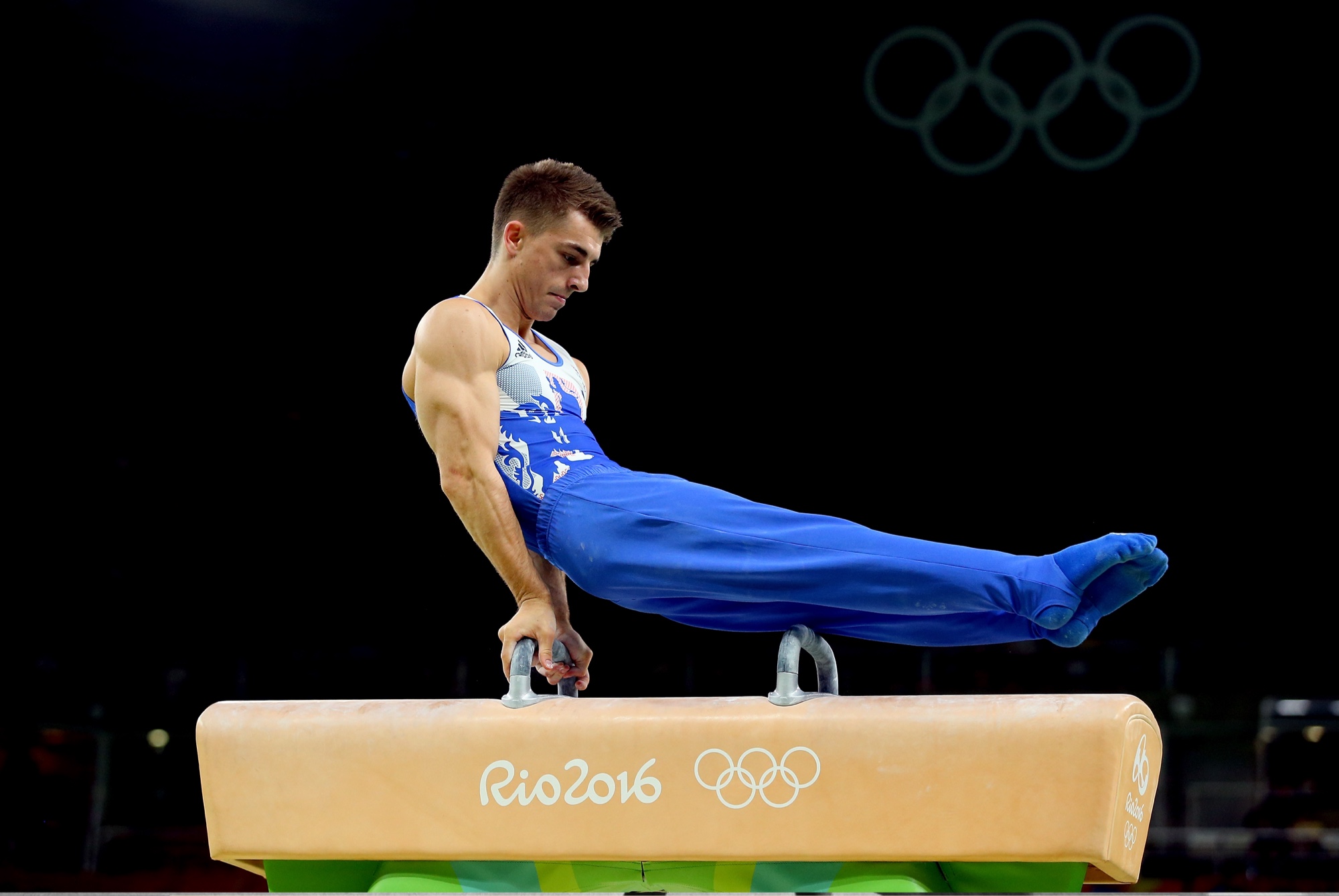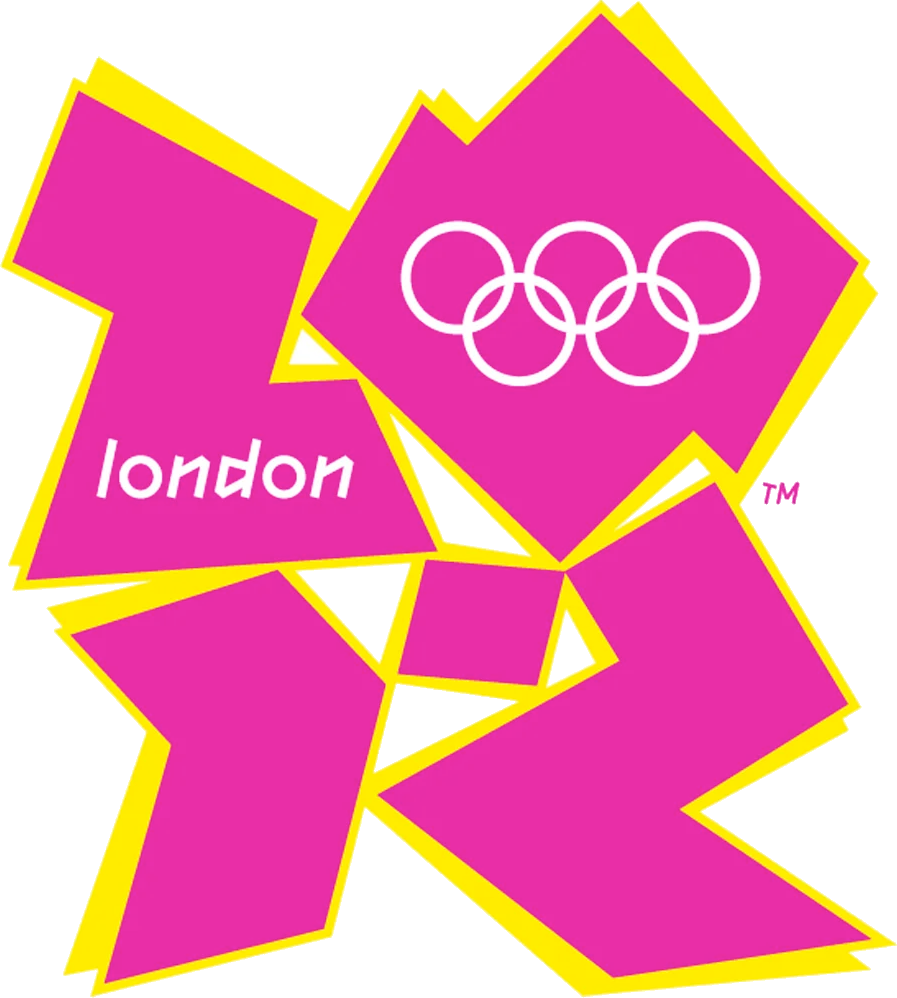Six Pommel Horse Olympic medals for Great Britain: how did it all happen?
Bleak times for the Men’s Artistic programme
Back in 2004, Men’s Artistic gymnastics was at its lowest point; the girl’s programme had managed to send a full team to the Athens Games, repeating their achievement of 2000. The men at this games managed a lone competitor, Craig Heap. Funding for the men was cut, and the MA community were suddenly out on their own.
After several meetings and heart-to-heart conversations in 2006, a new national coach was appointed. With openness and possibly an attitude of, we are all in this together, steadily, some improvements were made.
Photo – BG
Four years before, Beth Tweddle had won a bronze medal on bars at the European Championships – the first-ever major medal for a women’s artistic gymnast. Was this the catalyst that the men needed? British gymnasts can perform and medal on the international stage. Beth then went on to win bronze and then finally gold at the world championships on her favoured apparatus.
With the announcement of Great Britain hosting the 2012 Games in London, some money was made available for the men. Eddie Van Hoof was appointed National Technical Director in 2006 along with three national coaches – Andre Popov, Sergei Sizhanov and Barry Collie.
The emergence of one determined coach
There was, however, one coach who seemed to go his own way; he hadn’t read the history of doom and gloom of the past; he had a task to fulfil and just got on with it.
Using intuition, initiative, dedication and technical know-how, Paul Hall, by his own admission, an ex 2nd rate gymnast, had already made strides on one apparatus, in particular, the pommel horse. Paul was the coach to Louis Smith.
In 2007, Dan Keatings, from Huntingdon, coached by Paul, won the silver medal on Pommel Horse at the European Championships; this was the start of something big.
Meanwhile, another gymnast from Huntingdon was also making his mark. He had won the Junior European Pommel Horse title in 2004 & again in 2006; surely, this boy could go on to do great things.
He rose to the occasion in the senior ranks in Stuttgart in 2007 at the World Championships, coming 3rd on the pommels.
CLICK IMAGES TO VIEW FULL SIZE
Junior men make their mark
In 2008, the Junior GB men’s Artistic Gymnastics team won gold at the European Championships, beating Russia. Another indication of things to come and a coup for the British coaches and their programme. By now, Louis had progressed to the senior team, where perhaps he was disappointed that he didn’t make his mark in these 2008 Europeans; he failed to qualify for the pommel finals.
The 2008 Olympics
With these results, both Huntingdon gymnasts were selected for the 2008 Olympics. What a great tribute to Paul Hall’s coaching ability. Both gymnasts performed well, with Dan making the All-Around final and finishing in 20th position. Not bad for a first-year senior. This matched Neil Thomas in modern-day Olympics; Neil was 20th in the All-Around at Barcelona in 1992. We had achieved some great placings in 1908 where Walter Tysall won the silver medal and a further five gymnasts from GBR were in the top 20. Was this something to do with London being the host city? Nik Stuart did achieve 21st place in 1956, but this may have been due to the limited entry; there were only 63 competitors at these Melbourne Games contrasting with 185 in 1952 Helsinki and 130 in Rome in 1960.
Louis cool as cucumber
Though not making the All-Around final, Louis Smith did qualify in 5th place for the Pommel Horse final.
Paul Hall recalls
“On the day of the final, I was quite nervous, but Louis appeared relaxed and was singing reggae to his ipod on the bus to the venue. Warm up went well, and I nipped to the loo as the gymnasts prepared for the march into the Arena. I returned and could not find Louis anywhere. Seven gymnasts were in the line, and the Controller was calling for the final time, with no sign of the GB athlete. I was in a mild panic and searched the warm up gym for my missing gymnast. As I was leaning against the podium, a hand shot out from under the staging and grabbed my leg. ‘Surprise!’ said Louis, with a big grin. I jumped, and guided this crazy kid to the queue of gymnasts already marching out for the final at the Olympic Games, still grinning and pleased that he had managed to play a prank on his coach. Cool as the proverbial cucumber, he executed his complex routine, oblivious to the historic moment that saw him win GB gymnastics first Olympic medal in a century.
In the final he had upped his game. The score went up, 2nd place tying with Filip Ude of Croatia. His excitement was short lived as he was dropped to 3rd, learning for the first time the hard lesson of ‘count back’. He had a massive difficulty score of 6.7, the highest in the final, but this meant that his execution score was less than the gymnast from Croatia, whose execution score of 9.325 was three-tenths ahead of Louis. In the event of a tie, the gymnast with the highest execution is superior.”
2008 OLYMPIC POMMEL FINAL – TOP THREE
1, Xiao Qin, CHN, Difficulty 6.4, Total 15.875
2, Filip Ude, CRO, 6.4, 15.725
3, Louis Smith, GBR, 6.7, 15.725
Louis and Paul Hall have been working together since Louis was 8 years old. “Terry Sharpington (the late head coach at Huntingdon) saw what Louis was capable of before I did”, said Paul. “He is not the classic proportions for gymnastics, not the normal model for sport, but what a competitor, put the pressure on Louis, and he delivers.”
The question for Paul Hall after this historic occasion, only the 2nd British gymnast to win an Olympic medal and the first since 1908, was, could he keep his protege on track for another four years?
Enter tenacious coach number two
Scott Hann, a past GB squad gymnast, had taken over as head coach at South Essex Gym club after Jeff Davis had retired from the position. He, too, had the same analytical mind, this passion, determination and can-do attitude as Paul Hall. Although no SEGC gymnasts had reached the podium at the British championship in these years, a team of formidable talent had been winning the Adams Shield from 2010 with a young – Max Whitlock – as a team member. Max had also been part of the 2010 GB junior team that won gold at the European Championships and had come 2nd to Sam Oldham in the same event.
The 2012 Olympics
What an occasion! An Olympics in our backyard, surely, with the extra funding secured, the boys could go one better. Louis was selected for the team but only to compete on pommels and high bar with the hope of winning another medal on pommels. A young Max Whitlock from South Essex was also selected, working on all apparatus except the high bar.
A historic team medal
Anyone who was there or watched the events unfold will remember the excitement of the men’s team final at the 2012 Olympics. The way that the boys rose to the occasion, Kristian Thomas’ massive vault and, of course, two great scores on pommels; one from Louis and the second from the then practically unknown Max Whitlock. It was then a complete and delightful surprise to know that not only had Louis made the pommel final but so had Max, qualifying in 8th place.
Silver for Louis Smith
Louis again had to deal with the countback rule in the event of another tie. With a higher start score, his execution did not match Berki’s.
Louis says of his preparation
“I had been working on a 7.1 start value but only with a 30% success rate. I, therefore, decided to use the middle difficulty routine, the 7.0.”
Louis said on reflection that he was happy with his choice and when watched in slow motion as the best routine won, Berki. (The Times Book of the Olympics.)
Bronze for Max
Max qualified with 14.9 in the 8th slot. Berki only had 15.033 in qualification, qualifying in 5th slot. Louis had qualified as the leader.
Scott Hann, Max’s coach, recalls
“Max didn’t do his best routine in qualifications, and we didn’t think he would make the final. I sat with him through the remaining rounds, eagerly watching every routine performed. It was an intense wait, but after what seemed hours and hours of waiting, we learned he had narrowly scraped into the final. Neither of us could believe it, but we were so happy. Time to prepare for his first Olympic individual final. I had several people tell me that there is no way he can win a medal. He’s not a name! He’s not got the start score! He’s not got the experience! But I knew he had the potential; now it was about bringing that potential to life! The head coach said to me – I have a good feeling about today. Max went out and delivered a near-perfect routine and proved all the doubters wrong. A bronze medal and a springboard to an amazing career.”
Four years on Rio 2016
Both Louis and Max were selected as part of the British team. Louis was to work pommels only as he was expected to medal again on this piece. Max was the only British male to work all six pieces as not only was he trying for a pommel medal but also to medal in the All-Around.
As predicted, both Max and Louis qualified for the pommels. What another great achievement to have two Brits in the final. They qualified in 1st and 2nd. What a strong position to be in but also very precarious; they were both there to be knocked off their perches. Their scores were as follows in qualification.
2016 OLYMPIC POMMEL FINAL – QUALIFICATION
1 WHITLOCK Max GBR Difficulty 7.100, Execution 8.700, Total 15.800
2 136 SMITH Louis GBR 6.900 8.800 15.700
3 134 TOMMASONE Cyril FRA 6.900 8.750 15.650
Max’s difficulty score was the highest with Louis and the Frenchman on 6.900
Scott recalls
“When competing, Max stays focused. He never looks at the scores of others until the end of the competition. As Max was early up in the floor final, and he had the pommel final next he kept his head down. It was my job to keep an eye on what was going on and make any informed decisions going around. Max had performed a great routine on the floor and we were both happy with his score. There were some big names to perform after him, all capable of big scores, so we hoped to scrape a bronze medal maybe, but if not, we were happy as it set him up for the pommel final. One by one, the next performers made mistakes meaning Max stayed in the top spot. I remember Kristian asking him if he wanted to know the scores, but Max said no. As each gymnast went, Max’s medal colour changed. I tried hard to refrain from telling him anything but when the last competition finished and the score came out, I remember hitting Max in the leg and just saying you’re Olympic Champion! He was quite emotional and neither of us had planned or prepared for that! It was an amazing feeling, but we both knew we had to re-compose ready for the pommel final as that was what we were there to do. And that’s exactly what he did.”
The Final
Max and Louis both kept their nerve, with Max deciding he needed a bit of a cushion to win, so upped his start value by one-tenth. The result – a momentous gold and silver. This was a moment to treasure, a second Olympic gold medal for the UK in less than an hour.
2016 OLYMPIC POMMEL FINAL – SCORES
1, Max Whitlock, GBR, Difficulty 7.2, Execution 8.766, Total 15.966
2, Louis Smith, GBR, 6.9, 8.833, 15.833
3, Alexander Naddour, USA, 6.8, 15.700
Max was now a five-time Olympic medallist with his bronze medal in the All-Around won days previously (2 bronze medals in 2012 – team & pommels plus a bronze and 2 golds here at Rio).
Louis Smith awaits his score in the Pommel Horse final at the Rio 2016 Olympics
Photo – BG Getty Images
2nd – again – for Louis
What is ironic for Louis is that in 2008 and 2012, he had to take a step down due to his lower execution score. Here in Rio, his execution score was higher than Max’s; he must have been working so hard at improving his execution over the previous four years. In the end, Max’s difficulty score clinched the deal.
Louis’s record over three consecutive Olympics 2008, 2012 & 2016
Louis had just completed his 3rd Olympics, an achievement in itself, but to medal at each consecutive games on the same apparatus is one for the history books. Only the following male gymnasts have achieved this.
FLOOR EXERCISE
Nikolai Andrianov – Gold 1972, Gold 1976 & Silver 1980
VAULT
Nikolai Andrianov – Bronze 1972, Gold 1976 & Gold 1980
PARALLEL BARS
Li Xiaopeng – Gold 2000, Bronze 2004 & Gold 2008
HIGH BAR
Fabian Hambuchen – Bronze 2008, Silver 2012 & Gold 2016
POMMEL HORSE
Marius Urzica – Silver 1996 Gold 2000 & Silver 2004.
Louis Smith – Bronze 2008 (after count back), Silver 2012 (after count back) & Silver 2016.
For the record – two gymnasts have achieved the triple in the All-Around
Sawao Kato – Gold 1968, Gold 1972 & Silver 1976
Kohei Uchimura – Silver 2008, Gold 2012 & Gold 2016.
Louis bows out
Louis retired to continue in the entertainment business after winning Strictly Come Dancing in 2012.
Could Max complete the triple at the scheduled 2020 Olympics in Tokyo?
Scott Hann had talked of this dream to the author and how much this dream and this pressure weighed on both gymnast and coach. Max had to continue training at the highest level for the next four years. So the two of them set their programme, but not everything went to plan. In 2018 a young gymnast from Northern Ireland pipped Max to the post, winning pommels at the Commonwealth Games. Rhys McClenaghan then competed at the European Championships for Ireland in the same year in Glasgow. Max made a major error in the final allowing Rhys to take the gold. How low was his confidence at this stage? Coach and gymnast knew that they had to rebuild over the next two years.
Pandemic
Sportsmen and women around the globe were building up to the Tokyo Games when in February 2020, a new virus quickly spread throughout the world. Would the games go on? There was so much happening. Would it go ahead – yes, maybe and then finally, it was delayed. How can anyone keep their spirits and level of excellence up for another year?
The Tokyo Games – a year late
It had been agreed – Max would no longer do the All-Around but would just compete on the pommel as Louis had done in 2016. There was a difficulty. The IOC changed the rules regarding gymnastics; there would now only be four gymnasts per team. All four gymnasts will compete, but only three scores would count. Could GB afford to carry Max? A compromise was reached, Max was to work Pommels, Parallel Bars and High Bar. This tactic was also used by China and the Russian Olympic Committee team, whereby some gymnasts did not work all six apparatus. If the team reached the final then they would be reduced to 3 up and 3 to count from the team of 4; a format first used in 2012.
Pommel Horse qualification
Max’s execution performance in qualification was not his best; although he had the highest difficulty score, he was way down with his execution. And to cap it all, Rhys was lying in 2nd position. Notably, you had to go down to 16th position to get an execution score lower than Max’s.
Scott recalls the preparation
“After two cycles of training, competing, learning and succeeding, the build-up to Tokyo was something I (we) have never experienced before. After being able to count on one hand how many mistakes were made over 8 years of competing, we found ourselves finishing the Tokyo cycle with being able to count on one hand how many successful routines were hit. Struggling through a pandemic only made things harder, and in a surreal setting with no audience and severe restrictions, we arrive into the Games. We had both made the decision to focus on recovery over numbers, and found ourselves with nothing else to do other than ‘trust the process’. Even qualification wasn’t what we had hoped for, but he did enough to make the final.”
2020 OLYMPIC POMMEL FINAL – QUALIFICATION
1 180 LEE Chih Kai TPE Difficulty 6.400, Execution 8.866, Total 15.266
2 141 Mc CLENAGHAN Rhys IRL 6.500 8.766 15.266
2 147 KAMEYAMA Kohei JPN 6.500 8.766 15.266
4 195 YODER Alec USA 6.400 8.800 15.200
5 134 WHITLOCK Max GBR 6.800 8.100 14.900
The Final
Scott again
“Max was due to go second, so we practised walking out, a quick rest, then compete. The day before, we were informed Max would go first due to a tie-break rule. Bearing in mind Max had never competed first in a final, even with all his experience, it still caught us by surprise. After sitting down on the podium, not realising the green light was about to go on, Max stands up and presents to the judges. I have never been so unsure of what was about to happen. Max went into what I can only describe as a superhuman transformation calling on all of his experience. What transpired next, I’ll never forget. No matter what the journey has been or what experience I have, I was mesmerised by his performance, as I think he was. It was like he started and finished without realising the genius routine in between.”
His score was posted, 15.583, 2 tenths upon his difficulty score and 0.483 up on his execution score. Then the waiting, was 15.583 enough? Lee of China, the leader in qualification, was the real threat, but Max had to wait for another three gymnasts to perform before Lee performed at number 5. He had done it, Olympic champion back to back and three medals in 3 consecutive Olympics.
2020 OLYMPIC POMMEL FINAL – SCORES
1 134 WHITLOCK Max GBR Difficulty 7.000, Execution 8.583, Total 15.583
2 180 LEE Chih Kai TPE 6.700 8.700 15.400
3 148 KAYA Kazuma JPN 6.600 8.300 14.900
4 169 BELYAVSKIY David ROC 6.400 8.433 14.833
5 147 KAMEYAMA Kohei JPN 6.800 7.800 14.600
6 195 YODER Alec USA 6.400 8.166 14.566
7 141 McCLENAGHAN Rhys IRL 6.400 6.700 13.100
8 115 SUN Wei CHN 6.300 6.766 13.066
One for the history books
Max’s record matches that of the great Nikolai Andrianov, the only other gymnast to achieve back to back gold in the triple medal run for an individual Olympic apparatus final.
FLOOR EXERCISE
Nikolai Andrianov – Gold Munich 1972, Gold Montreal 1976 & Silver Moscow 1980
VAULT
Nikolai Andrianov – Bronze Munich 1972, Gold Montreal 1976 & Gold Moscow 1980
POMMEL HORSE
Max Whitlock – Bronze London 2012, Gold Rio 2016, Gold Tokyo 2020 (took place in 2021).
Written by Meg Warren with contributions from Paul Hall, Scott Hann
Est. 2018 | © GymnasticsHistory.co.uk 2025

